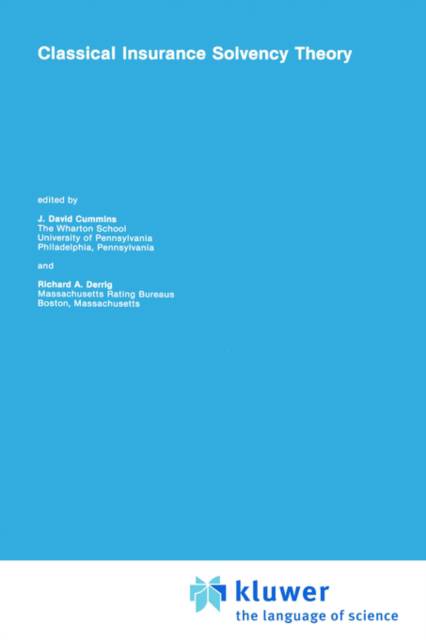
- Afhalen na 1 uur in een winkel met voorraad
- Gratis thuislevering in België vanaf € 30
- Ruim aanbod met 7 miljoen producten
- Afhalen na 1 uur in een winkel met voorraad
- Gratis thuislevering in België vanaf € 30
- Ruim aanbod met 7 miljoen producten
Zoeken
Classical Insurance Solvency Theory
€ 195,95
+ 391 punten
Omschrijving
The problem of solvency is, in fact, as old as insurance. The history of the industry knows many ways to meet the risks involved with underwriting, such as spreading the risk portfolio (Cato, Senior already applied it), risk selection, reserve funds, reinsurance, etc. Whilst these measures too often proved ineffective, the establish- ment of legislative control and public supervision ensued. However, not until the last few decades has the solvency issue become an ob- ject of intensive studies, very much thanks to the progress of related empirical and theoretical knowledge, and in the under- standing of the concerned complicated processes. The research activities have grown extensively in many countries in recent years. The more the studies advance the more new relevant aspects are detected and a great variety of alternative proposals have come up for discussion. Therefore, it has become necessary to attempt a survey of the whole problem area in order to be able to place the quite numerous pieces of knowledge in their proper context, and also, among other things, to avoid the pitfalls of handling isolated problems omitting vital tie-ins to the environment. Many of the rele- vant problems and subproblems are still lacking adequate and well tested solutions. Therefore, a survey of the whole problem area can also hopefully serve as guidance for future research efforts.
Specificaties
Betrokkenen
- Uitgeverij:
Inhoud
- Aantal bladzijden:
- 160
- Taal:
- Engels
- Reeks:
- Reeksnummer:
- nr. 8
Eigenschappen
- Productcode (EAN):
- 9780898382723
- Verschijningsdatum:
- 31/05/1988
- Uitvoering:
- Hardcover
- Formaat:
- Genaaid
- Afmetingen:
- 156 mm x 234 mm
- Gewicht:
- 449 g

Alleen bij Standaard Boekhandel
+ 391 punten op je klantenkaart van Standaard Boekhandel
Beoordelingen
We publiceren alleen reviews die voldoen aan de voorwaarden voor reviews. Bekijk onze voorwaarden voor reviews.










